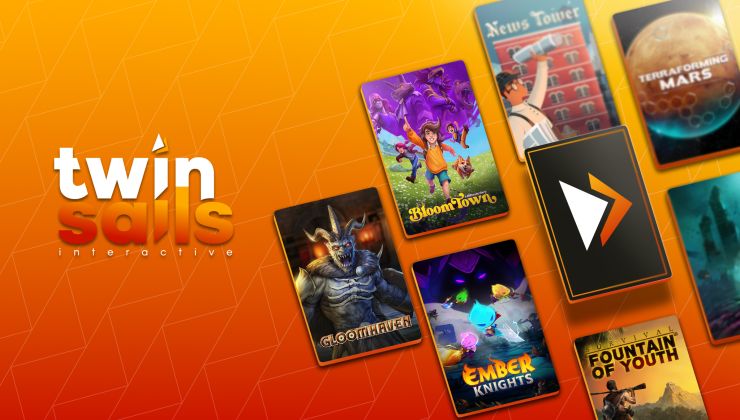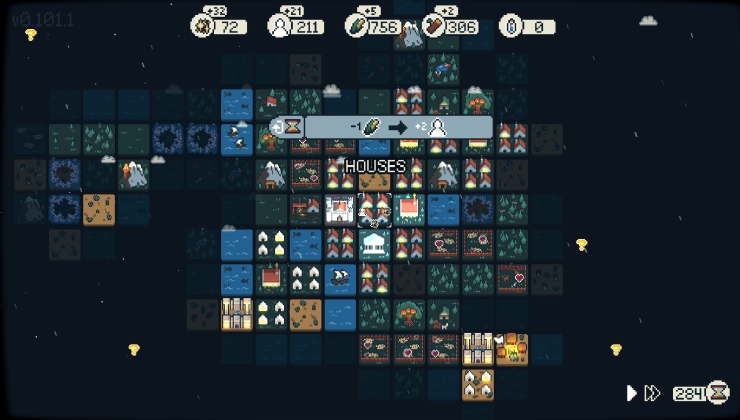By now you've probably heard either through us in our previous article or elsewhere that Valve are cooking something up to help Linux gaming even further. We have an idea on what one part of it is.
Valve already do quite a lot. There's the Steam Play Proton compatibility layer, the new container runtime feature to have Linux games both natively supported and Windows games in Proton run through a contained system to ensure compatibility, their work on Mesa drivers and much more.
In Valve's review of Steam in 2020 that we covered in the link above, one thing caught our eye and has been gaining attention. Valve mentioned for 2021 they will be "putting together new ways for prospective users to get into Linux gaming and experience these improvements" so what exactly does that mean? Well, a part of that might have already been suggested directly.
Back in November 2019, the open source consulting firm Collabora presented an overview of the work they have been doing funded by Valve. Towards the end of the talk they mentioned ongoing work towards foolproof and fast instant upgrades of Linux systems. Collabora mentioned it could work for specialised systems like consoles or other systems where you don't expect users to be highly technical. Leading into that, a Valve developer posted on Reddit to clarify more details around what Collabora were talking about:
The image-based updater work is part of a set of efforts to attempt to improve the experience of trying out Linux on a normal PC with live USB media, and instantly updating said media from the other OS without losing user data. There's no "locking down" involved, as it can easily be disabled by the user to fall back to the normal package manager.
Pierre-Loup Griffais, Valve
Linux has long been able to run directly from USB drives but what about the next stage of this evolution? That appears to be what Valve are hinting at in their 2020 review blog post.
Imagine if you will for a moment: a SteamOS-style USB stick, that's highly optimized for Linux gaming, with drivers ready to go and Steam pre-configured with everything it needs all direct from Valve and also this special update system to ensure it keeps on working. Now add in some pre-configured persistence so your games, files and so on stay on it and that sure sounds like a new way for users to get into and experience Linux gaming doesn't it? Steam Machines didn't work, so a way to properly experience Linux gaming in full on hardware people already own? That could certainly work.
That could be a much more interesting way to actually market and advertise Linux gaming too. It's not enough to have Linux distributions be fast and stable, and to have plenty of games available to play otherwise we would already be in a better position as a platform. An absolute game changer? No, but another very useful tool in the shed. The conversation changes with such an easy to use way to get involved. Burn it to a USB stick, load it on your PC and login to Steam, download a game and away you go — you're now gaming on Linux.
Not just for gamers though, this could be a pretty valuable tool for developers to test their games on Linux too. If it enables developers to quickly boot up a drive with Linux on, that's up to date and works with games, that's going to make things a lot easier in the long run from all sides.
USB drives have been ridiculously cost effective in the last few years too, along with plenty of USB3 options now existing for the speed and you can get quite a lot of storage on them so it would be a pretty fascinating move.
Over to you in the comments, what are your thoughts?
First, supporting every possible combination of HW people might have will certainly be a nightmare, if not impossible altogether. With pre built consoles you at least have a certain set of hw to make the software work with.
Second, they are bit late to the party. Gone are the days where most pc users knew and could easily boot into other media because the option was right there on POST. These days, thanks to fastboot and UEFI, most people don't even know how to get into UEFI settings, let alone change boot device.
supporting every possible combination of HW people might have will certainly be a nightmareNo different to exactly how things are now for both Linux and Windows. Except, Valve have more control over the software which was the point of SteamOS. This is an evolved form of it. Mixed with the container runtime to ensure compatibility, the burden is far lower than when they tried with Steam Machines.
Second, they are bit late to the party. Gone are the days where most pc users knew and could easily boot into other media because the option was right there on POST. These days, thanks to fastboot and UEFI, most people don't even know how to get into UEFI settings, let alone change boot device.That is a legitimate hurdle they would need to think on, with some clear instructions for what people can do. Perhaps even a simple tool to go along with it that does the burning, and gets Windows to allowing rebooting into it. There are ways around this problem that smarter people will no doubt have already thought of.
Steam Machines didn't work
They *could* have worked, and no reason why they could not now. But at the time, Proton was not a thing, you could not play your Windows games on SteamOS. There was no hardware subsidies in place, so most of the units were way too expensive for what they offered, and in general I thiuk it was marketed poorly.
Second, they are bit late to the party. Gone are the days where most pc users knew and could easily boot into other media because the option was right there on POST. These days, thanks to fastboot and UEFI, most people don't even know how to get into UEFI settings, let alone change boot device.
I feel like this is something that should be solvable with a Windows program that runs when you insert the USB stick that configures the reboot in the right way.
ofc glad we have valve steam + wine proton etc etc. But these are not the way linux could become competitive with gaming par windows.
we need native games we need big company for Linux coding. But still i believe linux wont be a prime os for desktop. it will stay where it is now. But as opensource i guess Google's Fuschia Os will be futures universal os.
its opensource and has a big company which has large ecosystem for its another own mobile os (chrome os) platform (stadia) this are baby steps for future.
Last edited by Kuduzkehpan on 16 Jan 2021 at 3:40 pm UTC
- Improve gamescope as a production ready wayland compositor optimized for gaming
- Porting some opengl games to Vulkan (my dream would be l4d2, but I know it's impossible)
- A new Arch-based official SteamOS
- Make Proton works with DRM and Media Foundation out of the box
- Support for ARM
- A new day one Linux official Game (why not)
Talking about steam running through a live media usb, I think this won't work very well mostly because of the limited storage size.
I don't know about your European / North American guys, But where I live, It's very rare to see someone with a 1 Tb pen drive, and the amount of boards still coming with usb 2.0 is outrageous!
So while I think it's awesome for valve to give this option, I don't think this will be a game changer as it sounds (I would like to be wrong here though)
I rarely reboot as it is. The idea of rebooting every time I want to play a game? It's not for me.
Does the old Windows trope "I see you moved your mouse, please reboot" still apply?
How did console X get to where it is now? By exclusive games.
The idea that user X is going to simply ditch his OS for no apparent reason is ridiculous to me.
Similar to what Hori said, if I already have a Windows system capable of playing games why would I reboot using a USB stick to play them in Linux?And that is the real question no one as of yet has a true answer for other than the existing arguments for using Linux over Windows that many of us are already aware of, and probably already using Linux for. Part of the point though, is to make trying it as easy as possible. We shall have to wait and see how Valve handles it but the quote in the article is pretty clear IMO on this being something of a plan of theirs.
A few possibilities I could think of:
1) A portable device you could "dock", like a Nintendo Switch? Play on its own or plug into your computer to use the more powerful hardware, but with the exact same OS. Not sure if it makes sense, though, and is massively difficult.
2) A way to play your own games in public computers, like cybercafes (yes, they are still popular in some places). They do have tools already for those, so this could be a very convenient tool.
3) Use it in thin clients, that play games through some kind of streaming (either in their servers, Stadia-like, or from your own gaming PC). Like an evolution of the current Steam Link, but with an entire OS attached?. Not sure why it would be a live OS though.
4) Investigating the possibilities of having a full isolated OS, with standardized libraries and stuff, to run the games. Like the extreme version of containerization. This sounds like it is either quite distant, or would be a massive headache for us that already use Linux.
5) Just a normal "it is now easier to try out Linux on your computer without commitment, which helps Linux adoption in the long term". Which I don't quite doubt anymore Valve would do, but wouldn't be a big thing in itself.
In any case, running an OS and games off of a USB stick is going to be a very poor experience and likely turn people off if anything.
Similar to what Hori said, if I already have a Windows system capable of playing games why would I reboot using a USB stick to play them in Linux? Would this interest existing Linux users at all?
You are not the real target of this.
I think Liam has missed one piece of the puzzle, which is: This usb bootable Linux will allow you to use an existing Steam Windows installation as a Steam library folder. That way a user that has never tried Linux can just plug it in the PC and play around with it, including testing the games he/she has already installed to see if they work (with Proton).
Seeing is believing, and a lot of people shy away from installing a OS just to try it, and this would be a minimal effort way to test the game the person actually plays.
Last edited by Julius on 16 Jan 2021 at 4:34 pm UTC
I think Liam has missed one piece of the puzzle, which is: This usb bootable Linux will allow you to use an existing Steam Windows installation as a Steam library folder. That way a user that has never tried Linux can just plug it in the PC and play around with it, including testing the games he/she has already installed to see if they work.I left that out intentionally, because running games off an existing NTFS partition has almost always caused problems.
Edit: as for other comments - i'm not saying this will move mountains or be huge or anything. I'm interested in it as an idea though, and merely explaining what it seems Valve are doing.
Last edited by Liam Dawe on 16 Jan 2021 at 4:36 pm UTC
1 - Steam Big Picture
2 - Proton (already great, but needs improvements)
3 - Marketing - They should give to Linux rhe attention it deserves, like releasing stuff for it before Windows or Mac. This could atract more players to Linux. For example: a Free game for Linux/Steam OS users...
4 - Work with ProtonDB and other Proton forks to make the Steam experience more straight forward.
5 - A good mobile app for the store and also for voice chat.
Last year, I finally made such a project! It requires some advanced Linux knowledge and has the potential to be 100% automated. I gave it to my buddy as a birthday present and it's been amazing. We are now playing our favorite childhood games together again!
https://github.com/ekultails/mac-linux-gaming-stick
Not just for gamers though, this could be a pretty valuable tool for developers to test their games too.I think this is the real reason. I have seen a number of small devs post comments like "I don't have a linux machine" in answer to questions about porting games (or fixing the games they already ported). If it is super easy to plug in a USB drive and have an instant test environment, it would make many of those excuses go away.
Original commemt:
What about the syscall emulation Collabora contribution (based in the seccomp mechanism, but ended up being a stand alone mechanism) making it's way in kernel 5.11 ?
https://youtube.com/watch?v=B35XhcmBDDI
This looks promising and looks like a few back and forth discussions went on and a few patches made it to the kernel already.
https://git.kernel.org/pub/scm/linux/kernel/git/torvalds/linux.git/log/?h=v5.11-rc3&qt=author&q=gabriel+krisman
Last edited by a0kami on 17 Jan 2021 at 8:16 am UTC











 How to set, change and reset your SteamOS / Steam Deck desktop sudo password
How to set, change and reset your SteamOS / Steam Deck desktop sudo password How to set up Decky Loader on Steam Deck / SteamOS for easy plugins
How to set up Decky Loader on Steam Deck / SteamOS for easy plugins
See more from me